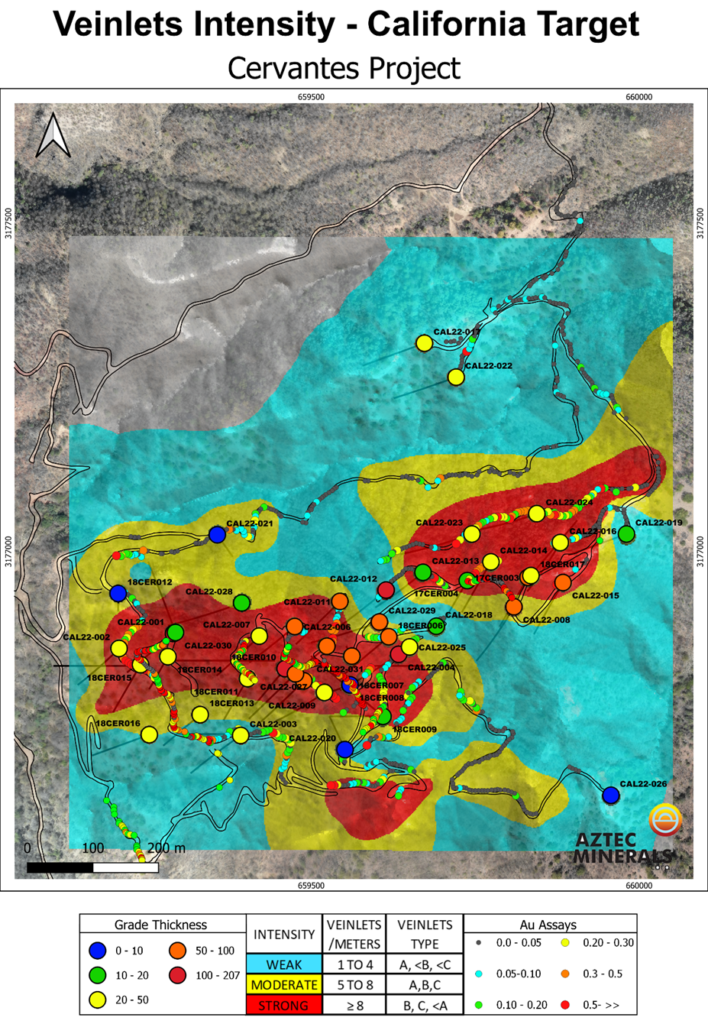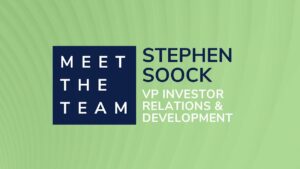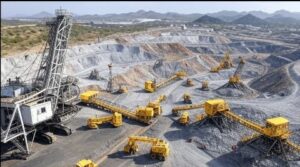VANCOUVER, BC / ACCESSWIRE / May 23, 2023 / Aztec Minerals Corp. (TSX-V:AZT)(OTCQB:AZZTF) has received sampling results from, and has completed, its Phase 1 2023 surface exploration program at its 100% owned Cervantes porphyry gold-copper project in Sonora, Mexico.
The phase 1 program of surface roadcut sampling and detailed geologic mapping has verified the strong relationships found between the quartz feldspar porphyritic intrusive, phyllic alteration and gold mineralization. Analysis of the results has found strong exploration potential to extend the California main target zone mineralization to the west, east, south and north (onto the California North target). Quartz veinlet intensity mapping shows strong correlation to the drillhole gold grade-thickness* (see Figure 1: California Target Veinlet Intensity). Gold has a strong, positive relationship with Cu, As, Ag, Bi and W, sericite and silica. There is a contrary relationship of gold to Mo and argillic alteration. Tourmaline and secondary biotite (potassic alteration) has a yet indeterminate relationship with gold.
Aztec mobilized two field crews in February and March to conduct a surface exploration program comprised of road cut sampling, Terraspec SWIR data collection and detailed geological mapping. Aztec collected 779 road cut channel chip samples of 5 meters length over 4,600 meters road distance and analyzed them for gold and multi-elements to expand and enhance geochemical and geological knowledge of the California and California North targets. View: Cervantes 2023 Phase 1 Road Cut Channel Sampling Map
Geological mapping at 1:200 scale was focused on the exposed road cuts with detailed lithological, structural and alteration mapping of the California and California North targets. The surface exploration program was conducted during the regional dry season. The field teams examined roadcut outcrop exposures generated from recently constructed drill roads and recorded detailed geological mapping for the lithologies, alterations (including hand samples for later Terraspec analysis), mineralization (with veinlet intensity and types), structures and geotechnical aspects. The road cuts were continuously chip channel sampled and then surveyed to consolidate surface data with the geochemistry of the drill hole dataset, as well as to assist in Leapfrog 3D modeling. A structural geology district-scale study will be conducted, especially to help establish the displacements of the mineralization since its emplacement.
Project data evaluation also continues to advance including using the understandings gained on the multi-element relationships with Au and applying them to the previous soil sampling data, reviewing the subsequent results to the geophysical data and the SWIR-Terraspec data, 3D modeling of the data, metallurgical, and multiple other investigations.
Based on the results of the Phase 1 surface sampling program, and ongoing data analysis, Aztec is now planning the 2023 Phase 2 exploration program of reverse circulation (“RC”) drilling to expand the mineralized California Au target in all compass directions, including connecting the California target with the California Norte target, and also to expand the California Norte target mineralization. Final plans for follow up drilling will be announced in the second quarter of 2023 and are subject to available funds.
The primary objectives of the 2023 exploration program are to continue to define the open pit, heap leach gold potential of the porphyry oxide cap at California, test the down dip extensions of the phyllic alteration in the Qfp intrusive for deeper copper-gold porphyry sulfide mineralization underlying the oxide cap, and test for extensions of the California Norte target.

* Grade-Thickness in meters-grams/tonne means the result of multiplying a drill hole intercept length, measured in meters, by the grade of the gold values in the intercept, the resulting compiled number is measured in grams/tonne. Grade thickness is not to be construed as gross metal value nor as a resource estimation. The California target does not have a current, compliant resource estimation at this point.
Cervantes Project Overview
Cervantes is a highly prospective porphyry gold-copper project located in southeastern Sonora state, Mexico. The project lies 160 km east of Hermosillo, Sonora, Mexico within the prolific Laramide porphyry copper belt approximately 265 km southeast of the Cananea porphyry copper-molybdenum mine (Grupo Mexico). Cervantes also lies along an east-west trending gold belt 60 km west of the Mulatos epithermal gold mine (Alamos Gold), 35 km northeast of the Osisko San Antonio gold mine, 45 km west of the La India mine (Agnico Eagle), and 40 km northwest of Santana gold deposit (Minera Alamos). View: Cervantes Project Location Map
Cervantes Project Highlights
- Large well-located property (3,649 hectares) with good infrastructure, road access, local town, all private land, water wells on property, grid power nearby
- Nine prospective mineralized zones related to high level porphyries and breccias along a 7.0km east-northeast corridor with multiple intersecting northwest structures
- Distinct geophysical anomalies, California target marked by high magnetic and low resistivity anomalies, high radiometric and chargeability anomalies responding to pervasive alteration
- Extensive gold mineralization at California zone, 118 soil samples average 0.44 gpt gold over 900 m by 600 m area, trench rock-channel samples up to 0.47 gpt gold over 222 m
- Extensive drilling at the California zone, intersecting gold oxide cap to a classic gold-copper porphyry system, drill results up to 1.49 gpt gold over 137 m and 1.00 gpt gold over 165m
- Excellent gold recoveries from preliminary metallurgical tests on drill core from California zone; oxide gold recoveries in bottle roll tests range from 75% to 87%
- Three-Dimensional IP Survey conducted in 2019, IP chargeability strengthens and broadens to >500m depth over an area 1100 m by 1200 m and extends strong chargeability anomalies to the southwest covering Estrella, Purisima East, and Purisima West, coinciding well with alteration and Au-Cu-Mo soil geochemical anomalies
California Target
Aztec has now completed over 10,500 meters of drilling over 54 drill holes at the Cervantes Project, primarily at the California target. In 2017-18, Aztec completed a Phase 1, 17 diamond core hole drill program, totaling 2,675 meters (m). The initial phase of drilling tested the California target 900m by 600m gold-in-soils anomaly that averaged 0.44gpt covering hydrothermal breccias within a Quartz feldspar porphyry stock intruding older siliciclastic sediments.
During the 2021 – 2022 exploration program, Aztec completed a further combined 7,837 m of drilling over 37 drill holes comprised of a 26-hole 5,248.6 m track-mounted reverse circulation drill program and an 11-hole 2,588 m man-portable oriented core program.
Every 2021-2022 drill hole, except one, of the 29 drill holes successfully completed out of 31 attempted at the California and the adjoining California Norte targets intersected near surface, oxidized gold mineralization with minor copper values. The drilling program expanded the footprint and the depth of the California target mineralization and alteration associated with the California porphyry intrusive complex with continued intercepts of broad gold mineralization.
The identified California target area drilled has been enlarged to approximately 900 meters long E – W by 730 meters wide N-S, and exploration drilling successfully expanded the primary California zone to an area now measuring approximately 900 meters long E-W by 250 to 500 meters wide N-S, with demonstrated, continuous mineralization of up to 170 meters depth. The porphyry gold-copper mineralization is still open in all directions with anomalous mineralization and alteration up to 265 meters depth vertically. The California and California Norte targets appear to be merging from drilling and surface exposures. Aztec’s drilling to-date has consistently intersected an oxidized gold cap to a porphyry-type gold-copper-silver system at California, including multiple 100+ meter widths exceeding 0.40 gpt gold.
Highlights of the Aztec’s 2017 – 2022 drill programs are as follows (see news releases dated June 26, 2018, and January 10, 2023):
- 137m @ 1.49 gpT Au incl 51.7m @ 3.42 gpT Au, 119m @ 0.091% copper in CAL22-005
- 165m @ 1.00 gpT Au incl 24.4m @ 4.25 gpT Au, 160m @ 0.065% copper in CAL22-004
- 152m @ 0.87 gpT Au, incl 33.5m @ 2.05 gpT Au, 123m @ 0.095% copper in CAL22-012
- 94m @ 1.04 gpT Au incl 15.2m @ 3.96 gpT Au, 55m @ 0.36% copper in CAL22-001
- 100m @ 0.75 gpT Au incl 9.14m @ 3.087 gpT Au, 138m @ 0.10% copper in CAL22-006
- 160m @ 0.77 gpT gold incl 80m @ 1.04 gpT gold, 0.11% copper in 18CER010
- 139m @ 0.71 gpT gold incl 20m @ 2.10 gpT gold, 0.16% copper in 17CER005
- 118m @ 0.63 gpT gold incl 43m @ 1.18 gpT gold, 0.16% copper in 17CER003
- 122m @ 0.60 gpT gold incl 62m @ 0.88 gpT gold, 0.06% copper in 18CER007
- 170m @ 0.42 gpT gold incl 32m @ 0.87 gpT gold, 0.06% copper in 18CER006
Preliminary metallurgical tests on California drill cores were conducted in 2019 (see news release dated March 12, 2019). Drill core samples were grouped into 4 separate types of mineralization: Oxide 1, Oxide 2, Mixed Oxide/Sulfide and Sulfide. The preliminary results of bottle roll tests showed excellent potential for heap leach gold recovery, as follows:
- 85.1% recovery on 2.0mm material and 94.3% on 75-micron material in sample Oxide 1
- 87.7% recovery on 2.0mm material and 94.2% on 75-micron material in sample Oxide 2
- 77.9% recovery on 2.0mm material and 89.0% on 75-micron material in sample Mixed Oxide/Sulphide
- 51.2% recovery on 2.0mm material and 78.7% on 75-micron material in sample Sulphide
Additional Targets
Purisima East – outcropping gossans, altered and mineralized diatreme breccias and porphyry intrusions marked by a 700m by 600m geochemical soil anomaly in 193 samples that average 0.25 gpt gold, a small historic ‘glory hole’ mine where rock chip sampling returned high-grade mineralization up to 44.6 gpt gold.
Estrella – outcrops of gossan and sulfides in silicified Paleozoic sediments near quartz porphyry dikes with rock chip samples up to 3.9 gpt gold and 2,010ppm copper.
Purisima West – a mirror image of Purisima East in size and type of gossans, altered and mineralized breccias and intrusions in association with gold and copper soil anomalies.
Jasper – 2017 trenching returned skarn/replacement-type mineralization up to 0.52% copper and 0.62 gpt gold over a 92.4 m length. In 2022 RC drilling found a broad zone of copper – gold mineralization in JAS22-001.
California North – coincident IP chargeability and gold-copper-molybdenum soil geochemical anomalies with demonstrated gold – copper mineralization by RC drilling, it may be a north extension of the California target
Other targets – porphyry alteration and geochemical soil anomalies mark the Jacobo and Brasil prospects, but more work is required to expand and define these targets
Allen David Heyl, B.Sc., CPG., VP Exploration of Aztec, is the Qualified Person under NI43-101, supervised the Cervantes exploration program. Mr. Heyl has reviewed and approved the technical disclosures in this news release.
“Simon Dyakowski”
Simon Dyakowski, Chief Executive Officer
Aztec Minerals Corp.
About Aztec Minerals – Aztec is a mineral exploration company focused on two emerging discoveries in North America. The Cervantes project is an emerging porphyry gold-copper discovery in Sonora, Mexico. The Tombstone project is an emerging gold-silver discovery with high grade CRD silver-lead-zinc potential in southern Arizona. Aztec’s shares trade on the TSX-V stock exchange (symbol AZT) and on the OTCQB (symbol AZZTF).
Contact Information – For more information, please contact:
Simon Dyakowski, President & CEO, Director
Tel: (604) 619-7469
Fax: (604) 685-9744
Email: simon@aztecminerals.com
Website: www.aztecminerals.com
Neither the TSXV nor its Regulation Services Provider (as that term is defined in the policies of the TSXV) accepts responsibility for the adequacy or accuracy of this release. No stock exchange, securities commission or other regulatory authority has approved or disapproved the information contained herein.
Forward-Looking Statements:
Certain statements contained in this press release may constitute forward-looking statements under Canadian securities legislation. Generally, forward-looking information can be identified by the use of forward-looking terminology such as “expects” or “it is expected”, or variations of such words and phrases or statements that certain actions, events or results “will” occur. These forward-looking statements are subject to a number of risks and uncertainties. Actual results may differ materially from results contemplated by the forward-looking statements. Factors that could cause actual results to differ materially from those in forward-looking statements. Accordingly, the actual events may differ materially from those projected in the forward-looking statements. When relying on forward-looking statements to make decisions, investors and others should carefully consider the foregoing factors and other uncertainties and should not place undue reliance on such forward-looking statements. The Company does not undertake to update any forward-looking statements, except as may be required by applicable securities laws.
SOURCE: Aztec Minerals Corp.
Original Article: https://www.accesswire.com/756589/Aztec-2023-Surface-Exploration-Program-Results-Enhance-Drill-Targeting-at-Cervantes-Gold-Copper-Project-Sonora-Mexico


















